11 Health Benefits Of Almonds, Nutrition Facts, & Side Effects
A handful of these nuts every day can keep your skin, hair, and health in top shape.
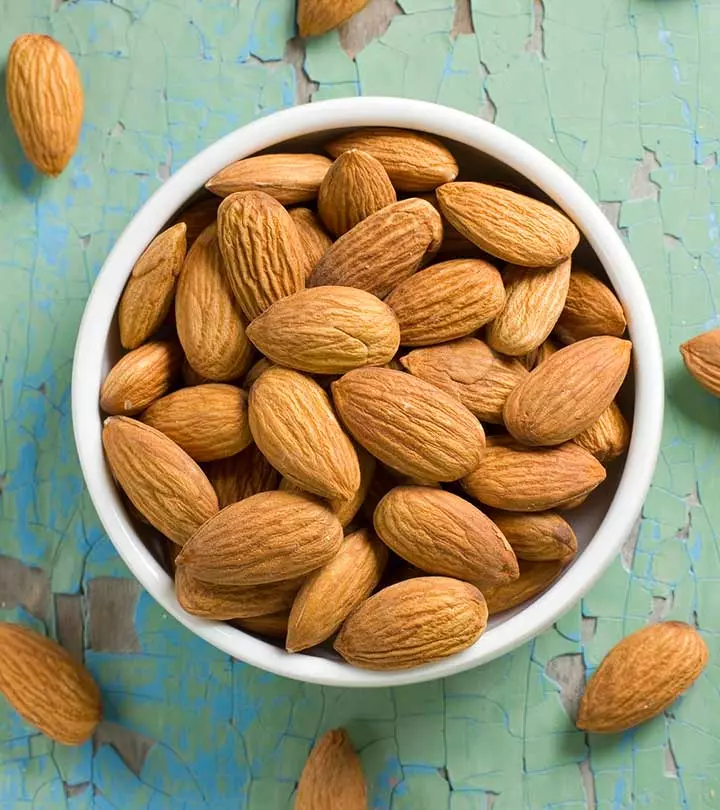
Image: Shutterstock
The many benefits of almonds make it an ideal healthy snack. Almonds (Prunus amygdalus) have light orange-brown color and have been used since 3000 BC.
Almonds provide a wide range of vitamins, minerals, polyphenols, and dietary fiber that make them a valuable source of nutrition. In addition, the antioxidants and anti-inflammatory properties of almonds make them a good treatment for skin and hair-related problems.type 2 diabetes
Almonds contain many nutrients, such as polyunsaturated fatty acids (PUFAs), monounsaturated fatty acids (MUFAs), and fibers. Furthermore, almonds contain significant amounts of minerals and vitamins like calcium, magnesium, potassium, phosphorus, iron, copper, zinc, manganese, vitamin E, thiamine, vitamin B, and many phytonutrients (1).
Therefore, they may aid in managing chronic and acute conditions such as diabetes, obesity, heart disease, and hyperlipidemiai A condition when the blood has high levels of fats and lipids such as cholesterol and triglycerides. (1). Some studies also show that almonds may also aid in cancer prevention (2).
This article discusses the benefits of almonds, their nutritional profile, how to use them, and any potential side effects. Take a look.
 Know Your Ingredient: Almond
Know Your Ingredient: AlmondWhat Is It?
An edible seed of the Prunus dulcis tree that is native to Iran.
What Are Its Benefits?
Provides nutrients beneficial for the skin and hair, boosts brain function and heart health, and improves the body’s energy level.
Who Can Consume It?
All except those who are allergic to tree nuts.
How Often?
20 almonds a day.
Caution
Bitter almonds may increase the risk of cyanide poisoning. Avoid consuming it if you are allergic to tree nuts.
In This Article
How Do Almonds Benefit Your Health?
Almonds are treasure chests of nutrients like vitamin E, zinc, potassium, and fatty acids. They can boost your memory, maintain good vision, boost your immune system, improve digestion, and keep you full for a long time.
1. Almonds: Powerhouses Of Nutrients
Almonds can be a great snack.
They are nutrient-rich, low carb, and high-energy seeds that do not compromise on pleasing your palate.
They are popular for their health benefits due to their nutrient composition. Almonds are rich in nutrients like mono-unsaturated fatty acidsi One of the healthy dietary fats found in abundance in nuts, which helps in lowering bad cholesterol. (MUFAs), poly-unsaturated fatty acidsi One of the healthy dietary fats essential for brain function and includes omega-3 and omega-6 fatty acids. (PUFAs), and dietary fibers.
They are also reserves of minerals and vitamins. These include calcium, potassium, magnesium, phosphorus, copper, iron, zinc, manganese, thiamine, vitamin B, vitamin E, and several phytonutrients (1).
Almonds boast an impressive nutritive profile. 1 oz (28 g) of almonds contains 14 g of fat, 6 g of protein, and 164 calories (3).
The way almonds are consumed determines their measured metabolizable energy (ME).
Metabolizable energy is the net energy remaining after fecal and urine loss. In other words, ME represents the energy available for vital processes like growth, reproduction, work (locomotion), and respiration (1).
The measured ME of whole natural almonds, whole roasted almonds, and chopped almonds were found to be significantly less than the measured ME of almond butter (1).
The ME of whole natural almonds was lesser than that of whole roasted almonds (1). Consuming soaked almonds benefits your health, as soaking enhances their nutrient availability and supports digestive health. There are many more soaked almond benefits that you should know about to improve your health and stamina.
2. May Soothe, Tone, And Rejuvenate Your Skin
Almonds are rich in oils and vitamin E. These unsaturated fats and polyphenols work as excellent skin conditioners. This is why ancient schools of medicine used almond oil to treat dry skin issues.
Almond oil can be used to treat dry skin conditions, such as psoriasisi An autoimmune condition that causes skin inflammation leading to dry, itchy, and scaly patches. and eczema. It may also help improve your skin tone and complexion. Further studies are needed to determine its efficacy in treating post-operative scarring (4).
These seeds are natural sources of ⍺-tocopherol, which, along with 7 other members, is known as vitamin E. Tocopherols are photoprotectants. They prevent skin damage caused due to exposure to sunlight and UV rays (5), (6).
Almonds are especially known for their antioxidants. Almond polyphenols – especially flavonoids – are amazing free radical scavengers. They also have an anti-inflammatory effect on your skin. Similarly, green almonds are equally good. The benefits of green almonds include their high antioxidant content, which helps in promoting youthful skin and boosting energy levels.
In short, almonds in your diet or almond oil can treat dry skin, scars, wrinkles, pigmentation, and photodamagei The skin changes, like wrinkles and pigmentation, that occur due to prolonged exposure to the sun’s UV rays. (5), (6), (7).
Kayleigh, a skin care and beauty blogger, tried almond oil on her face and shared her experience on her personal blog: “Every night, I’ve been putting 3–4 drops [of almond oil] on my fingertips and then massaging [it] into my face so it really soaks in. Since I’ve been using it, not only have I been waking up to super soft skin, [but] even when I take my makeup off at night, it’s still smooth then (i)!”
 Quick Tip
Quick Tip3. May Stimulate Hair Growth
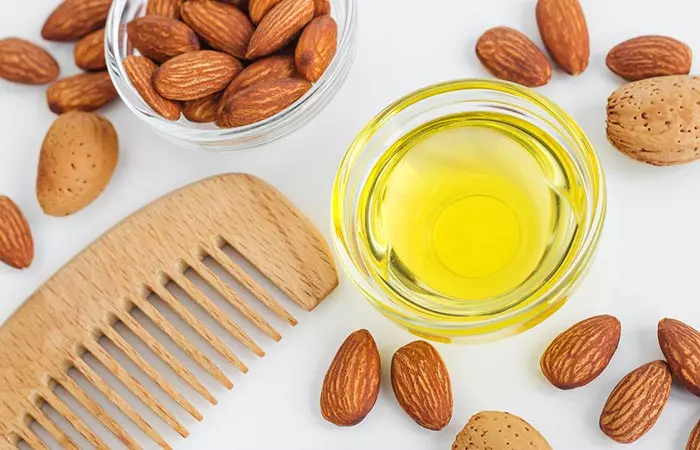
Hair loss is a growing problem among contemporary women and men. Blame the modern diet, lifestyle, pollution, hormonal imbalance, malnutrition, and even overnutrition for it. A variety of therapies can help you cope with this problem. Oil massage is a classic option.
Almond oil massage is one of the safest remedies for hair growth. It takes time to get absorbed into your scalp, but the vitamin E in it may condition your hair. Studies show that vitamin E supplementation may also increase hair numbers in people experiencing hair loss (8).
More importantly, deficiency of micronutrients can manifest as hair fall. Biotin deficiency is rare but results in thinning hair. It may cause hair fall, rashes, brittle nails, and exoskeleton issues.
Roasted almonds are said to be good sources of biotin (¼ cup has about 1.5 mcg of biotin).
Hence, adding almonds to your diet and massaging its oil onto your hair and scalp may stimulate healthy hair growth (9).
4. May Boost Memory, Brain Health, And Cognition
Tree nuts like almonds are natural sources of tocopherol, folate, mono and polyunsaturated fatty acids, and polyphenols. These nutrients may prevent or delay the onset of age-related cognitive disorders and amnesia (10).
Rat studies have shown that almonds, when given for 28 days, significantly improved memory retention.
Almond phytochemicals also control cholesterol levels. This ensures no oxidized plaques block the neurons. The acetylcholine in almonds was proposed to be the active compound here (10).
This shows the nootropici A class of substances that can boost brain performance and may enhance cognition and memory. properties of almonds.
Diets that contain almonds are said to be extremely healthy. For instance, the Mediterranean diet that includes olives, almonds, and other nuts, tomatoes, spinach, garlic, asparagus, and chickpeas can promote overall brain health. This is all thanks to the unsaturated fats they offer (11).
5. May Aid Weight Loss
Almonds induce a sense of satiety when you snack on them. They are nutrient-dense. This prevents hedonic hunger snacking and overeating, ultimately preventing weight gain.
The unsaturated fats in almonds lower cholesterol. Almonds are also great sources of dietary fiber (1 oz. contains 3.5 g of fiber, 2.4g of insoluble fiber). High-fiber foods take time to digest, thus making you feel full for longer (12).
However, this mechanism of almonds needs to be studied. Not many researchers believe almonds can aid weight loss. It depends on your entire diet plan and not just one ingredient, right?
You may still go ahead and add 1440 kJ equivalent serving of almonds with a limited risk of weight gain (13).
6. Can Boost Good Cholesterol (HDL) Levels

Consuming tree nuts like almonds have been shown to reduce bad cholesterol (LDL).
Almonds are good sources of monounsaturated fats and polyunsaturated fats that regulate the LDL levels in individuals with diabetes and high cholesterol as well as their healthy counterparts (14).
Eating almonds as part of your regular diet can help raise the good (HDL) cholesterol in circulation. Substituting high-carb snacks with almonds (about 43g/day) is a good way to start (15).
Having a higher HDL than LDL level in circulation benefits several organ systems – primarily, your heart (16).
7. May Offer And Aid Cardiovascular Protection
Tree nuts, like almonds, contain high fiber, unsaturated fat, and phytochemicals. This profile is known to bring down the risk of cardiovascular diseases (CVD) (1).
This has been proven recently by studying the Mediterranean diet. A Mediterranean diet supplemented with 30 g/day tree nuts (almonds, hazelnuts, and walnuts) was shown to decrease the risk of cardiovascular events by 28 % (17).
Almonds contain nutrients such as folic acid, L-arginine, vitamin E, and vitamin B. These nutrients can modulate the vascular function (vasodilatory property) of the circulatory system.
These seeds can also tone down inflammation and oxidative stress in your body.
Therefore, almonds can protect you from coronary heart disease (CAD), atherosclerosisi It is the build-up of cholesterol, fats, and other substances in the artery wall, narrowing the passage and restricting blood flow. , and high blood pressure (hypertension) (1), (17).
8. May Improve Glycemic Control And Diabetes
Studies have demonstrated that almonds can decrease the after-meal escalation in blood sugar. They assist in stabilizing blood sugar levels in people with diabetes (18), (19).
Eating about 60 g/day of almonds increases the intake of dietary fiber, magnesium, polyunsaturated fatty acids, monounsaturated fatty acids, and vitamin E (18).
Most of these phytonutrients have antioxidant properties that reduce the risk of oxidative damage to proteins (20).
Almonds control your blood sugar levels, boost HDL levels, trap the circulating LDL molecules, combat oxidative stress, and induce satiety. These properties also reduce the risk of cardiovascular diseases in individuals with type 2 diabetes.
9. May Induce Satiety, Boost Energy And Improve Gastric Environment

Almonds have a tough texture. They can be hard to break down. In fact, a significant proportion of raw almond tissue is preserved intact even after chewing, digestion, and large bowel fermentation. But, chewing (masticating) them constantly releases more lipids and more energy (21), (22).
Another bonus of eating almonds is that it gives you a sense of fullness (satiety) because of their slow disintegration rate.
Roasting almonds increases their disintegration rate. They also get digested quicker than raw ones (21).
Snacking on a few almonds post-lunch can deal with the post-lunch dip in alertness, memory, and focus (23). They pump your energy levels.
One ounce of almonds gives about 164 kcal (kilocalories), pistachios give 159 kcal, and peanuts give 161 kcal of energy (2). Choose your mid-day nibbles wisely!
Snippet Time!
Almond oil can be applied topically to your skin. However, it remains mostly on your skin’s surface. Like jojoba and avocado oils, it does not penetrate your skin’s layers.
It contains free unsaturated fatty acids (e.g., oleic acid), the molecules of which may disrupt the skin barrier and enhance its permeability for other compounds present in plant oils (23).
This is why almond, jojoba, avocado, and soybean, oils make ideal carrier oils.
10. May Promote And Maintain Eye Health
If you want perfect vision, you need to consume nutrients like vitamins and minerals that have antioxidant and anti-inflammatory functions. These include vitamin C, vitamin E, zinc, carotenoids, and omega-3 fatty acids. These micronutrients work on the oxidative stress and inflammation affecting your eyes (24).
The macula of the retina is said to have high concentrations of free radicals which may damage the proteins and DNA in those cells. Antioxidants protect the macula from degeneration.
Carotenoids like lutein and zeaxanthin improve the pigment density of this region.
Omega-3 fatty acids, particularly docosahexaenoic acid (DHA), fight ocular inflammation.
Eating foods rich in these micronutrients can prevent loss of vision, macular degeneration, and other eye disorders (25), (26).
Almonds contain fair amounts of vitamin E (7 mg TE per ¼ cup) and zinc (0.9 mg/oz.). While vitamin E prevents platelet aggregation and improves vasodilation, zinc plays a vital role in cell signaling and nerve-impulse transmission.
Eating small amounts of almonds may not prevent eye problems, but they may control their severity (26).
11. May Strengthen Bones And Prevent Bone Diseases
Consuming 1200 mg of calcium every day is mandatory for all women and men above 51 years. This is recommended by the National Osteoporosisi A condition that results in loss of bone mineral density and mass, making them brittle and weak. Foundation (NOF) to avoid osteoporosis and other bone diseases (26).
Many studies have shown low calcium intake to be associated with low bone mass, bone loss, and high fracture rates (27), (28).
Dairy products contain calcium. However, foods like spinach, tofu, almonds, kale, broccoli, fortified orange juice, and canned fish like sardines and salmon also contain good amounts of calcium.
Experiments on human bone cell lines (osteoclasts) have revealed that almond meal can inhibit osteoclast formation. It also interferes with the gene expression and functioning of osteoclasts (29).
Thus, almonds, like other calcium-rich foods, have a positive effect on your bone health. You may need additional vitamin D supplementation and physical activity, depending on your body’s calcium index (30).
What is responsible for making almonds beneficial for your health?
It is, undoubtedly, their nutrient composition.
Go through the almonds’ nutritional facts in the next section to know why.
Key Takeaways
- Almonds help you increase memory and improve vision and digestion.
- Rich in vitamin E oil, almonds improve your skin tone and rejuvenate the skin.
- They also strengthen bones and muscles, reduce the risk of heart disease, and help in hair growth.
- Almonds boost energy levels and give a sense of fullness.
Nutrition Profile Of Almonds
| Nutritional value per 1 cup, whole (143 g) | |||
|---|---|---|---|
| Nutrients | Units | Quantity | |
| Water | g | 6.31 | |
| Energy | kcal | 828 | |
| Energy | kJ | 3465 | |
| Protein | g | 30.24 | |
| Total lipid (fat) | g | 71.40 | |
| Ash | g | 4.25 | |
| Carbohydrate, by difference | g | 30.82 | |
| Fiber, total dietary | g | 17.9 | |
| Sugars, total | g | 6.22 | |
| Sucrose | g | 5.65 | |
| Glucose (dextrose) | g | 0.24 | |
| Fructose | g | 0.16 | |
| Maltose | g | 0.06 | |
| Galactose | g | 0.10 | |
| Starch | g | 1.03 | |
| Minerals | |||
| Calcium, Ca | mg | 385 | |
| Iron, Fe | mg | 5.31 | |
| Magnesium, Mg | mg | 386 | |
| Phosphorus, P | mg | 688 | |
| Potassium, K | mg | 1048 | |
| Sodium, Na | mg | 1 | |
| Zinc, Zn | mg | 4.46 | |
| Copper, Cu | mg | 1.474 | |
| Manganese, Mn | mg | 3.116 | |
| Selenium, Se | mg | 5.9 | |
| Vitamins | |||
| Thiamin | mg | 0.293 | |
| Riboflavin | mg | 1.627 | |
| Niacin | mg | 5.174 | |
| Pantothenic acid | mg | 0.674 | |
| Vitamin (B6) | mg | 0.196 | |
| Folate, total | µg | 63 | |
| Folate, food | µg | 63 | |
| Folate, DFE | µg | 63 | |
| Choline, total | mg | 74.5 | |
| Betaine | mg | 0.7 | |
| Carotene, beta | µg | 1 | |
| Vitamin A, IU | IU | 3 | |
| Lutein + zeaxanthin | µg | 1 | |
| Vitamin E (alpha-tocopherol) | mg | 36.65 | |
| Tocopherol, beta | mg | 0.33 | |
| Tocopherol, gamma | mg | 0.92 | |
| Tocopherol, delta | mg | 0.10 | |
| Choline, total | mg | 74.5 | |
| Choline, total | mg | 74.5 | |
| Choline, total | mg | 74.5 | |
| Lipids | |||
| Fatty acids, total saturated | g | 5.437 | |
| Fatty acids, total monounsaturated | g | 45.118 | |
| Fatty acids, total polyunsaturated | g | 17.630 | |
| Fatty acids, total trans | g | 0.021 | |
| Fatty acids, total trans-monoenoic | g | 0.017 | |
| Stigmasterol | mg | 6 | |
| Campesterol | mg | 7 | |
| Beta-sitosterol | mg | 186 | |
| Other constituents | |||
| Cyanidin | mg | 3.5 | |
| (+)-Catechin | mg | 1.8 | |
| (-)-Epigallocatechin | mg | 3.7 | |
| (-)-Epicatechin | mg | 0.9 | |
| Eriodictyol | mg | 0.4 | |
| Naringenin | mg | 0.6 | |
| Isorhamnetin | mg | 3.8 | |
| Kaempferol | mg | 0.6 | |
| Quercetin | mg | 0.5 | |
| Genistein | mg | 0.01 | |
| Total isoflavones | mg | 0.01 | |
| Coumestrol | mg | 0.01 | |
| Proanthocyanidin dimers | mg | 13.2 | |
| Proanthocyanidin trimers | mg | 10.9 | |
| Proanthocyanidin 4-6mers | mg | 39.2 | |
| Proanthocyanidin 7-10mers | mg | 40.3 | |
| Proanthocyanidin polymers (>10mers) | mg | 114.8 | |
| Total isoflavones | mg | 0.01 | |
(Source: USDA)
Almonds have a strong phytochemical composition. They contain tannins, flavonoids, phenolic acids, lignans, and stilbenes in varying proportions in the seed and skin.
Almond proanthocyanidins include epicatechin, epiafzelechin, and catechin. Tannins like gallotannins, ellagitannins, and phlorotannins that release gallic acid, ellagic acid, and phloroglucinol upon hydrolysis have also been identified in them (31).
When it comes to flavonoids and flavanols, almonds contain cyanidin, catechin, dihydrokaempferol, dihydroquercetin, epicatechin, epicatechin gallate, epicatechin glycoside, gallocatechin gallate, isorhamnetin, kaempferol, quercetin, and their 3-O-glucosides, galactosides, rutinoside, eriodictyol, naringenin, and their glucosides are present in fair amounts (31).
Hydroxycinnamic acid, chlorogenic acid, ferulic acid, caffeic acid, and sinapic acid have also been identified in almonds, but not all are quantified (31).
Under lignans, almonds contain secoisolariciresinol, lariciresinol, cyclo-lariciresinol, pinoresinol, sesamin, syringaresinol, 7-hydroxymatairesinol, and matairesinol-7-hydroxy secoisolariciresinol. Biochanin A is the most abundant almond isoflavone. It is followed by genistein, daidzein, glycitein, and formononetin (31).
That’s a ton of nutrition! If all these nutrients and phytonutrients get to work on your body, you’ll definitely be in the pink of health!
 Fun Fact
Fun FactTo find out how and how much of almonds you should have, scroll down.
What Are The Ways To Add Almonds To Your Diet?

Several studies suggest that consuming about 10–100 g of almonds a day can improve glucose homeostasis and lipid metabolism in your body. Making them a regular addition to your diet can ward off most CVDs (32).
Each almond seed should weigh about 1-1.5 g, and 1 oz. should roughly have 20-23 almonds. You can have 8-10 almonds in a day.
To get started, use almonds as a baking garnish or salad add-on. If they suit you, try them as a snack. You can enjoy them in both salted and unsalted forms. Roasting almonds before serving them brings out their crunchy taste.
You can also have them in your breakfast/meal smoothie. Blend almond milk, fruits, and frozen yogurt to make a delicious smoothie.
Use almond paste in the preparation of soups or vinaigrettes.
Sprinkle slivered, blanched almonds over desserts. Diced almonds work best for stuffing and coatings.
If you haven’t tried almond butter, give it a shot as well. It tastes like heaven! There are various almond butter benefits for your health also, which you should definitely know. We are talking about health with taste!
You can substitute regular cow/buffalo milk with almond milk. Using almond flour instead of regular refined flour can also be a healthy option.
Wondering what can happen if you eat too many almonds in a day?
What Are The Side Effects Of Eating Too Many Almonds?

Almonds contain essential fats, fiber, vitamin E, and phytonutrients. When taken within limits, they are great for your health. But, having too many almonds can be toxic. Here’s what could happen:
- Cyanide Poisoning
Bitter almonds store fair amounts of cyanide in their seeds. Each almond seed might release 0.9 to 4.9 mg of hydrogen cyanide per gram. The lethal dose for cyanide is about 50 to 300 mg for an adult. If your almond intake has crossed this dose of cyanide, it may poison you. Consult a doctor immediately (33).
- Bloating
You may feel too full, uncomfortable, and bloated if you eat too many almonds due to their high fiber content (34).
- Vitamin E Overdose
You may experience nausea, diarrhea, intestinal cramps, weakness, fatigue, headache, and/or blurred vision if you consume an excessive amount of vitamin E in the form of almonds.
The RDA for vitamin E in adults is 15 mg/day. One ounce (28 grams) of whole almonds contains 7 mg of vitamin E. So, plan your intake accordingly (35).
- Drug Interactions
Anticoagulants, chemotherapy drugs, statins, etc., might interact with vitamin E in almonds. This might happen rarely, but the possibility exists (35).
Almond allergy is also a common allergy that might result in complications. According to an almond challenge study conducted with 590 patients, 475 subjects (81%) were sensitized to almonds, and 545 (92%) tolerated the challenge with mild reactions. Of the 545, 21 (4%) had grade 2/3 allergic symptoms, and 3 (0.5%) had anaphylaxis.
Peanuts and almonds are two popular nuts that can improve your overall health. But which one is better for you? Find out in the next section.
Almonds Vs. Peanuts
Both almonds and peanuts are nutritional powerhouses and would be an excellent addition to your diet. While they have similar nutrients, they are present in different amounts. Peanuts have a higher protein and folate content. Almonds, on the other hand, have a higher potassium, magnesium, phosphorus, and calcium content. Peanuts have a mild, sweet, earthy flavor, while almonds have a sweet, slightly bitter flavor. If you are looking for a low-calorie snack, you can opt for almonds as they have a lower calorie content compared to peanuts (3), (36). You can choose either one or both as per your preferences and culinary needs.
The Take-Home Message…
Almonds are energy-dense nuts packed with several essential vitamins and minerals. These nuts boost energy and may aid in weight loss, reduce bad cholesterol levels, boost memory and cognition, improve skin tone, and stimulate hair growth. However, having too many almonds may increase the risk of cyanide poisoning and bloating. These nuts may also interact with anticoagulants and chemotherapy drugs. Hence, consume them in moderation.
Frequently Asked Questions
How many almonds should you eat a day?
Eating roughly 12-15 almonds a day is good for your health.
Is it better to eat almonds with skin or without?
You can eat almonds raw along with their skin. Almond skin flavonoids have been shown to possess antioxidant activity in experimental models. However, some people prefer soaked and skinned almonds over raw ones (1).
What is the best time to eat almonds?
Breakfast is a good time to eat almonds (37).
Can we eat almonds on an empty stomach?
Yes, you can eat almonds on an empty stomach to increase and speed up the absorption of nutrients.
Can we drink water after eating almonds?
Do not drink water after consuming nuts with high oil content, like almonds. It may lead to fat deposition in the food pipe, resulting in irritation and coughing.
Can I eat almonds at night?
Yes, almonds contain the sleep-supporting amino acid tryptophan and proteins that will keep you full all night.
What happens if we eat almonds without soaking?
Your body cannot absorb all the nutrients from almonds if you eat them without removing the skin. Soak them in water overnight for better release of nutrients.
Illustration: Health Benefits Of Almonds Nutrition Facts & Side Effects
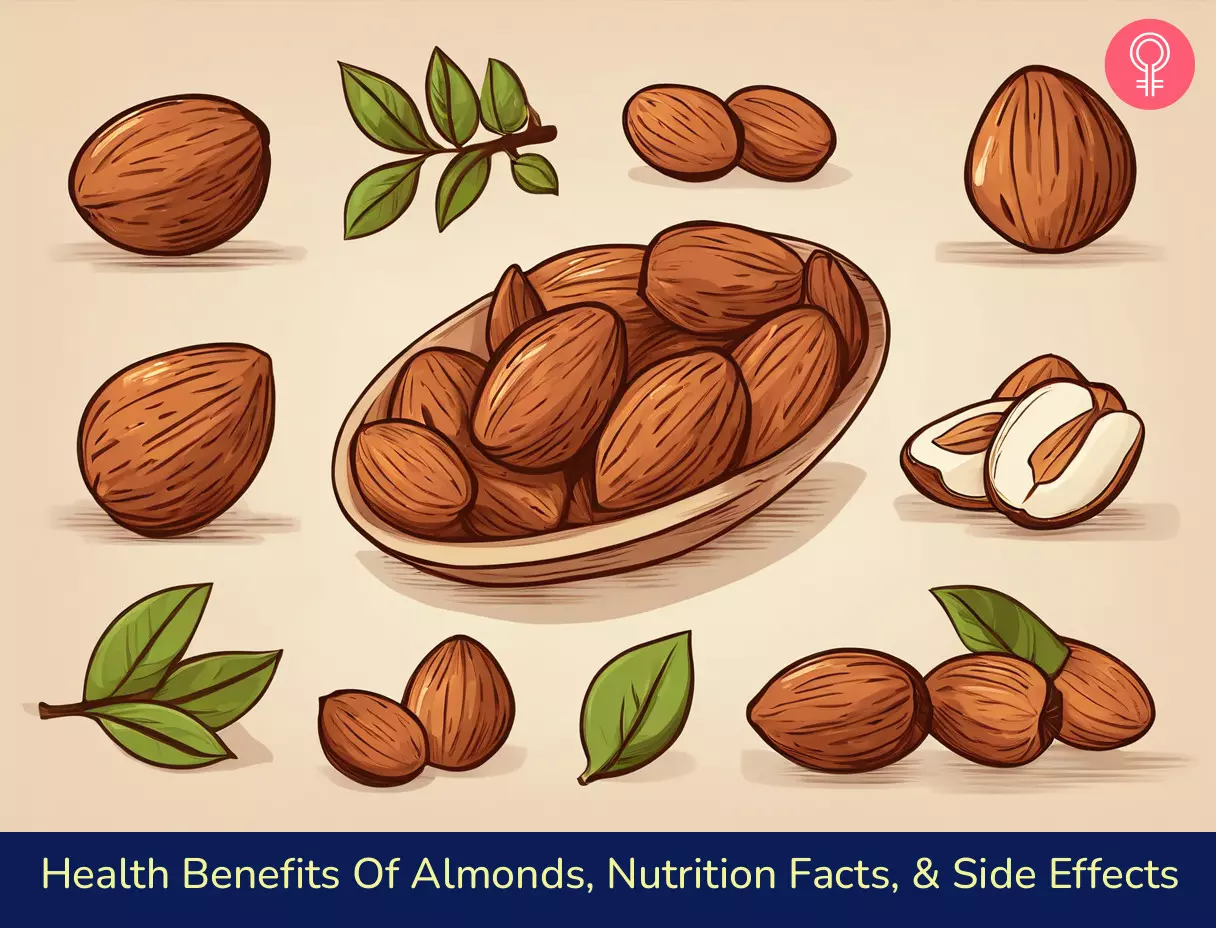
Image: Stable Diffusion/StyleCraze Design Team
References
Articles on StyleCraze are backed by verified information from peer-reviewed and academic research papers, reputed organizations, research institutions, and medical associations to ensure accuracy and relevance. Read our editorial policy to learn more.
- Almonds and Cardiovascular Health: A Review, Nutrients, US National Library of Medicine, National Institutes of Health.
https://www.ncbi.nlm.nih.gov/pmc/articles/PMC5946253/ - The Benefits of Nuts for Cancer Prevention, Journal of the Advanced Practioner of Oncology.
https://www.ncbi.nlm.nih.gov/pmc/articles/PMC6750921/ - Nuts, Almonds, USDA, U.S. Department Of Agriculture.
https://fdc.nal.usda.gov/fdc-app.html#/food-details/170567/nutrients - The uses and properties of almond oil, Complementary therapies in Clinical Practice, US National Library of Medicine, National Institutes of Health.
https://pubmed.ncbi.nlm.nih.gov/20129403/ - The Role of Phytonutrients in Skin Health, Nutrients, US National Library of Medicine, National Institutes of Health.
https://www.ncbi.nlm.nih.gov/pmc/articles/PMC3257702/ - Anti-Inflammatory and Skin Barrier Repair Effects of Topical Application of Some Plant Oils, International Journal Of Molecular Sciences, US National Library of Medicine, National Institutes of Health.
https://www.ncbi.nlm.nih.gov/pmc/articles/PMC5796020/ - Soft & Silky Hair, Health & Environmental Research on Makeup of Salinas Adolescents, UC Berkeley, School of Public Health.
https://cerch.berkeley.edu/sites/default/files/do_it_yourself_beatuy_recipes.pdf - Effects of Tocotrienol Supplementation on Hair Growth in Human Volunteers, Tropical Life Sciences Research, US National Library of Medicine, National Institutes of Health.
https://www.ncbi.nlm.nih.gov/pmc/articles/PMC3819075/ - Biotin, Health Information, Office of Dietary Supplements, National Institutes of Health.
https://ods.od.nih.gov/factsheets/Biotin-HealthProfessional/ - Repeated administration of almonds increases brain acetylcholine levels and enhances memory function in healthy rats while attenuates memory deficits in animal model of amnesia, Brain Research Bulletin, US National Library of Medicine, National Institutes of Health.
https://pubmed.ncbi.nlm.nih.gov/26548495/ - Boost your memory by eating right, Harvard Women’s Health Watch, Harvard Health Publishing, Harvard Medical School.
https://www.health.harvard.edu/mind-and-mood/boost-your-memory-by-eating-right - Almonds (Prunus Dulcis Mill. D. A. Webb): A Source of Nutrients and Health-Promoting Compounds, Nutrients.
https://www.ncbi.nlm.nih.gov/pmc/articles/PMC7146189/ - Effect of chronic consumption of almonds on body weight in healthy humans, The British Journal Of Nutrition, US National Library of Medicine, National Institutes of Health.
https://pubmed.ncbi.nlm.nih.gov/17445351/ - Effects of almond consumption on the reduction of LDL-cholesterol: a discussion of potential mechanisms and future research directions, Nutrition reviews, US National Library of Medicine, National Institutes of Health.
https://pubmed.ncbi.nlm.nih.gov/21457263/ - Inclusion of Almonds in a Cholesterol-Lowering Diet Improves Plasma HDL Subspecies and Cholesterol Efflux to Serum in Normal-Weight Individuals with Elevated LDL Cholesterol, The Journal of Nutrition, US National Library of Medicine, National Institutes of Health.
https://www.ncbi.nlm.nih.gov/pmc/articles/PMC5525107/ - Anti-Inflammatory and Skin Barrier Repair Effects, International Journal of Molecular Sciences.
https://www.psu.edu/news/research/story/almonds-may-help-boost-cholesterol-clean-crew/ - Effect of almond consumption on vascular function in patients with coronary artery disease: a randomized, controlled, cross-over trial, Nutrition Journal, US National Library of Medicine, National Institutes of Health.
https://www.ncbi.nlm.nih.gov/pmc/articles/PMC4469426/ - Almond consumption improved glycemic control and lipid profiles in patients with type 2 diabetes mellitus, Metabolism: Clinical and Experimental, US National Library of Medicine, National Institutes of Health.
https://pubmed.ncbi.nlm.nih.gov/20580779/ - The impact of nuts consumption on glucose/insulin homeostasis and inflammation markers mediated by adiposity factors among American adults, Oncotarget, US National Library of Medicine, National Institutes of Health.
https://www.ncbi.nlm.nih.gov/pmc/articles/PMC6101284/ - Almonds decrease postprandial glycemia, insulinemia, and oxidative damage in healthy individuals, The Journal of Nutrition, US National Library of Medicine, National Institutes of Health.
https://pubmed.ncbi.nlm.nih.gov/17116708/ - Digestion of Raw and Roasted Almonds in Simulated Gastric Environment, Food Biophysics, US National Library of Medicine, National Institutes of Health.
https://www.ncbi.nlm.nih.gov/pmc/articles/PMC2854608/ - Mastication of almonds: effects of lipid bioaccessibility, appetite, and hormone response, The American Journal of Clinical Nutrition, American Society for Nutrition.
http://ucce.ucdavis.edu/files/datastore/608-11.pdf - Effects of almond consumption on the post-lunch dip and long-term cognitive function in energy-restricted overweight and obese adults, The British Journal Of Nutrition, US National Library of Medicine, National Institutes of Health.
https://pubmed.ncbi.nlm.nih.gov/28183366/ - Anti-Inflammatory and Skin Barrier Repair Effects of Topical Application of Some Plant Oils, International Journal Of Molecular Sciences, US National Library of Medicine, National Institutes of Health.
https://www.ncbi.nlm.nih.gov/pmc/articles/PMC5796020/ - Nutrients for the aging eye, Clinical Interventions in Aging, US National Library of Medicine, National Institutes of Health.
https://www.ncbi.nlm.nih.gov/pmc/articles/PMC3693724/ - Top foods to help protect your vision, Harvard Health Letter, Harvard Health Publishing, Harvard Medical School.
https://www.health.harvard.edu/staying-healthy/top-foods-to-help-protect-your-vision - Keeping bones strong, Healthbeat, Harvard Health Publishing, Harvard Medical School.
https://www.health.harvard.edu/staying-healthy/keeping-bones-strong - Bone Health for Life: Health Information Basics for You and Your Family, NIH Osteoporosis and Related Bone Diseases National Resource Center, National Institute of Arthritis and Musculoskeletal and Skin Diseases.
https://www.niams.nih.gov/health-topics/bone-health-and-osteoporosis - Postprandial effects of almond consumption on human osteoclast precursors–an ex vivo study, Metabolism: Clinical and Experimental, US National Library of Medicine, National Institutes of Health.
https://pubmed.ncbi.nlm.nih.gov/20947104/ - Osteoporosis Prevention, Division of Health Promotion and Chronic Disease, West Virginia Department of Health & Human Resources.
https://dhhr.wv.gov/hpcd/FocusAreas/osteoporosis/Pages/Osteoporosis-Prevention.aspx - The phytochemical composition and antioxidant actions of tree nuts, Asia Pacific Journal of Clinical Nutrition, US National Library of Medicine, National Institutes of Health.
https://www.ncbi.nlm.nih.gov/pmc/articles/PMC5012104/ - Nuts and Human Health Outcomes: A Systematic Review, Nutrients, US National Library of Medicine, National Institutes of Health.
https://www.ncbi.nlm.nih.gov/pmc/articles/PMC5748761/ - (R)-Amygdalin, PubChem, U.S. National Library of Medicine.
https://pubchem.ncbi.nlm.nih.gov/compound/656516#section=Toxicity - Fiber-How, Student Affairs, Duke Student Health Nutrition Services.
https://students.duke.edu/ - Vitamin E, Office of Dietary Supplements, National Institutes of Health.
https://ods.od.nih.gov/factsheets/VitaminE-HealthProfessional/#h2 - Peanuts, all types, raw, US Department of Agriculture
https://fdc.nal.usda.gov/fdc-app.html#/food-details/172430/nutrients - How to eat nuts the healthy way, Harvard Health Publishing.
https://www.health.harvard.edu/staying-healthy/how-to-eat-nuts-the-healthy-way
Read full bio of Ariana Fiorita
Read full bio of Sindhu Koganti
Read full bio of Ravi Teja Tadimalla
Read full bio of Himanshi Mahajan





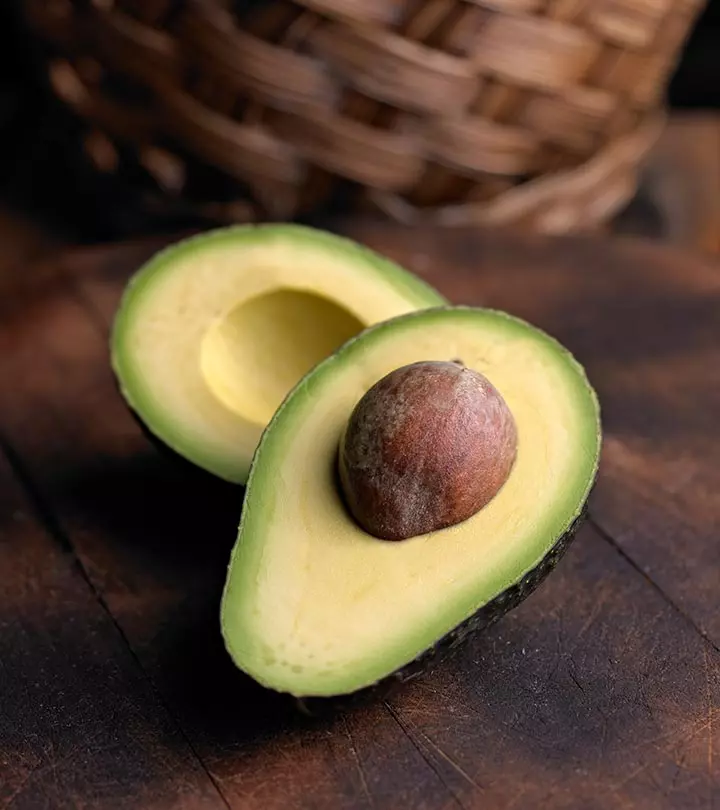
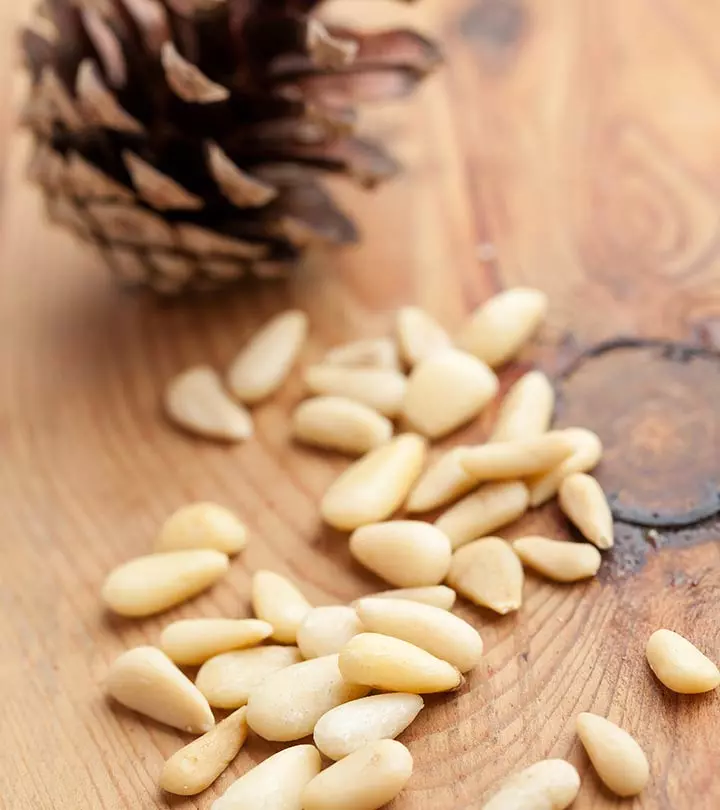
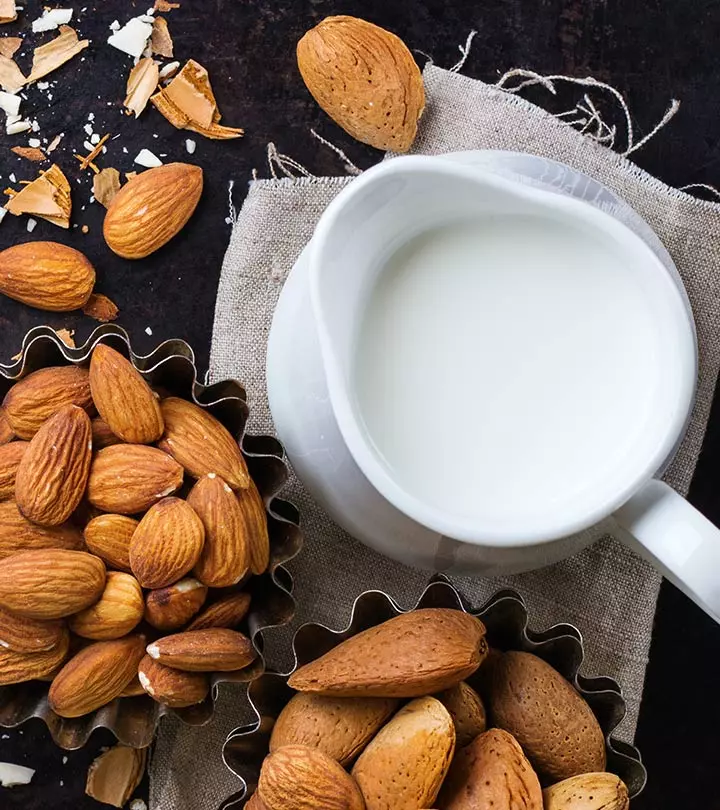
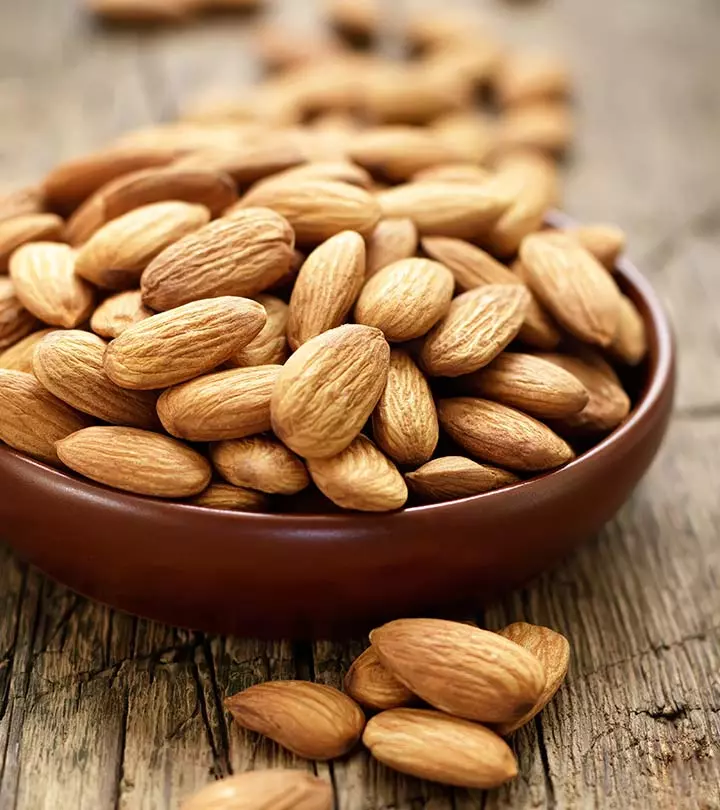

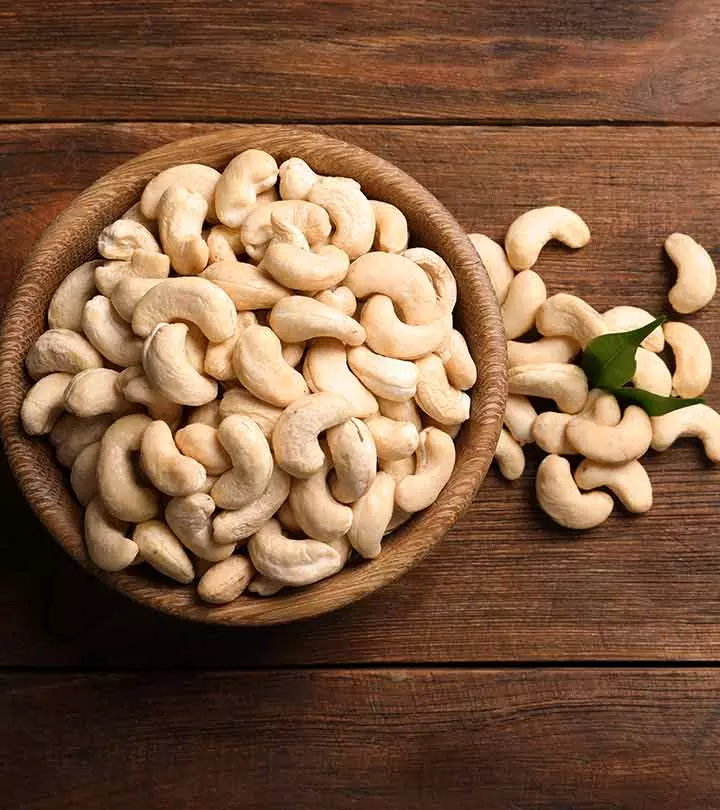
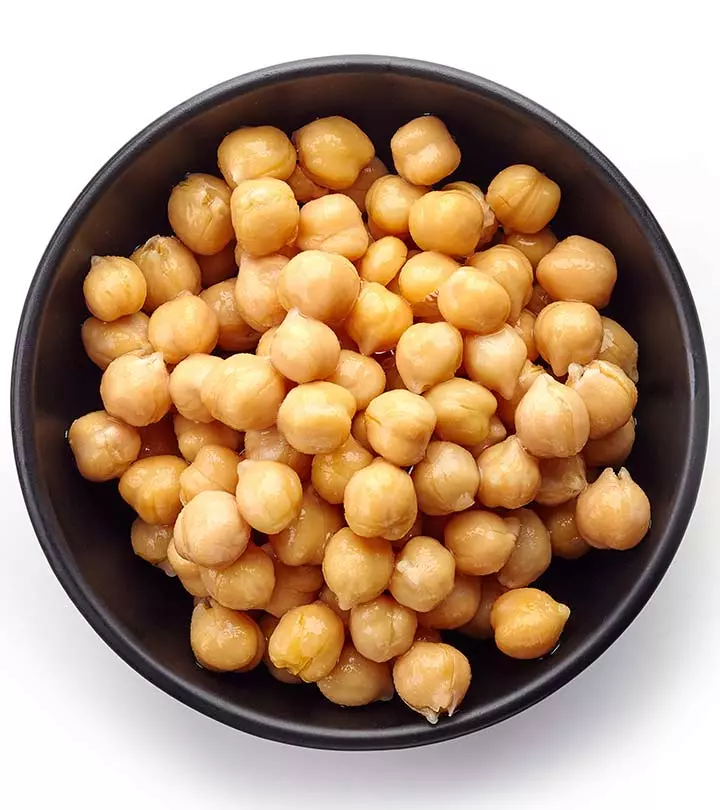



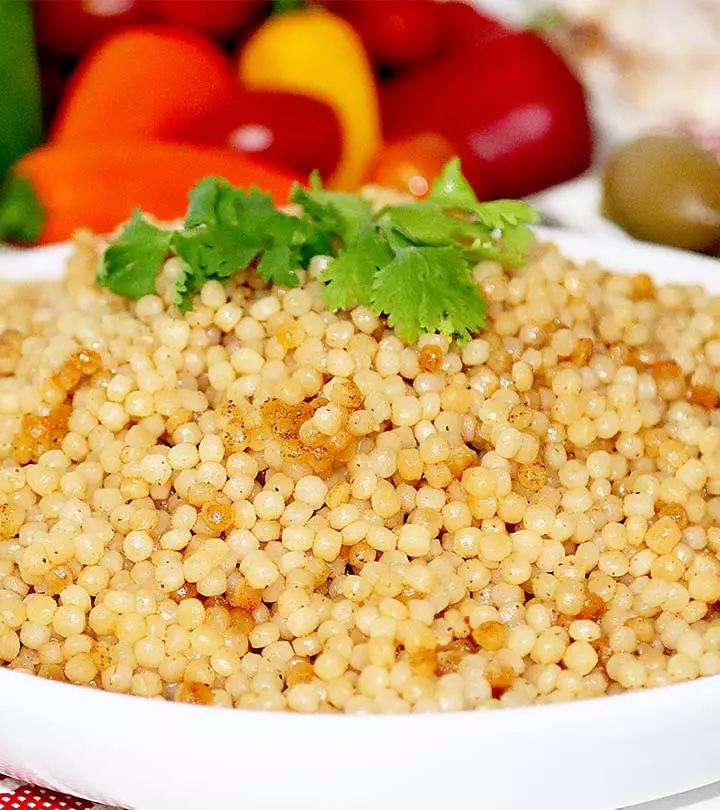
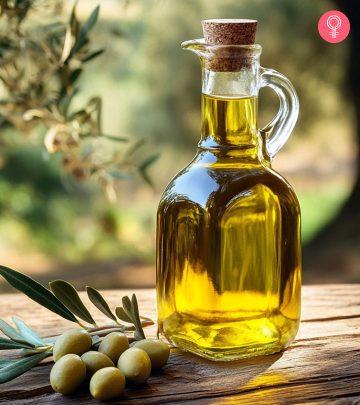
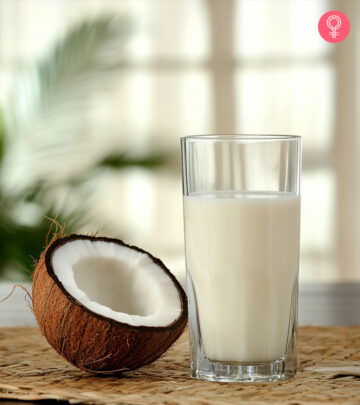



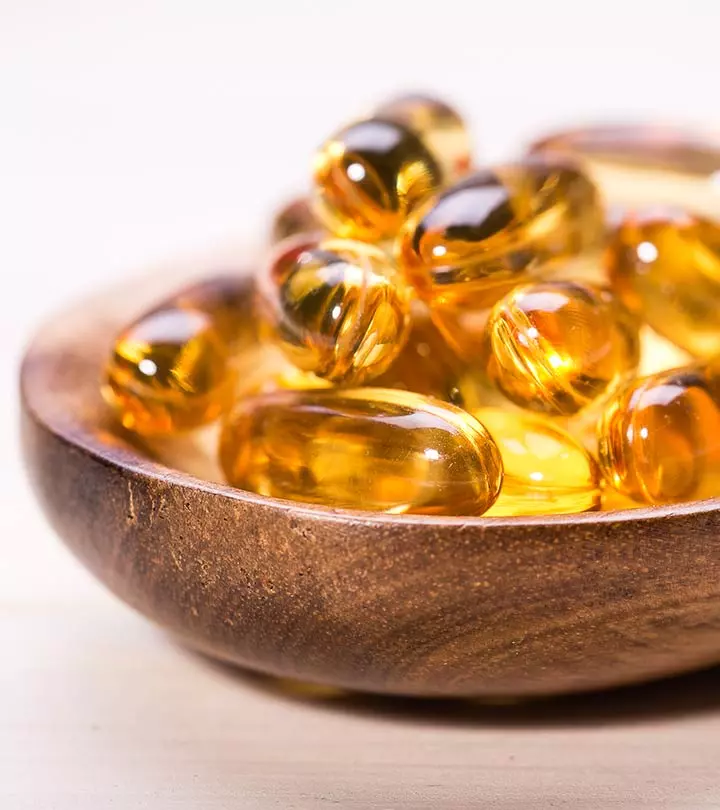



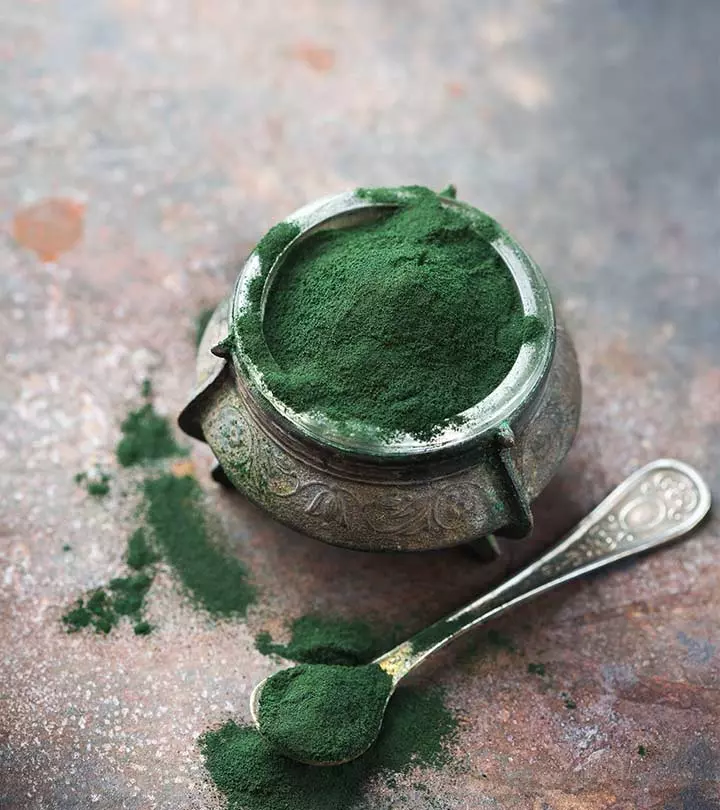
Community Experiences
Join the conversation and become a part of our empowering community! Share your stories, experiences, and insights to connect with other beauty, lifestyle, and health enthusiasts.